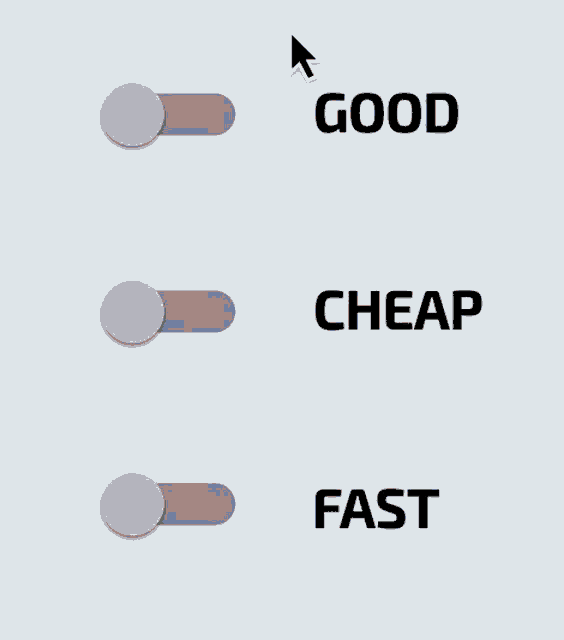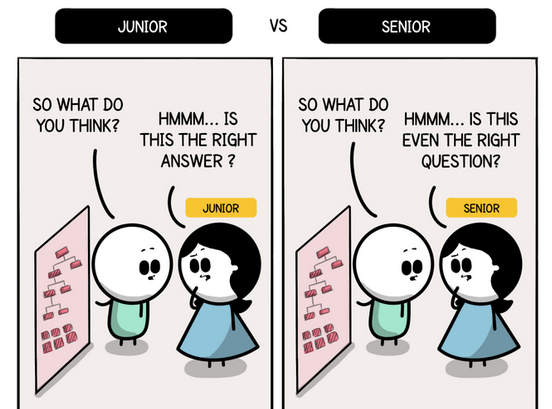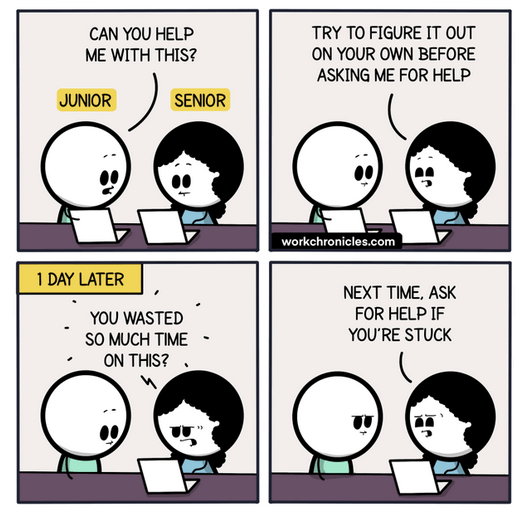I’m a junior developer, recently hired, and I have to prove my worth. That’s why I have to complete my tasks as soon as possible, avoid getting stuck, and be as efficient as possible…
Well, the last sentence should give us a starting point: things done in a rush are rarely done right. To be fast, neat, and efficient, you need a lot of experience. Expecting this from a junior developer is not right, nor fair.
A person who is fast, efficient, and can detect and avoid blockers, is, by definition, not a junior developer.

Time is not all
The pressure to be efficient and productive can lead developers, especially the younger and less experienced ones, to feel the need to rush things. This can be detrimental in many aspects: from mental health to missed deadlines, broken deliveries, or low-quality output.
One of the main reasons why a junior developer shouldn’t rush is their lack of experience. New developers often lack the depth of knowledge and understanding needed to properly analyze problems and figure out a set of tasks efficiently and accurately.
The rush to demonstrate their capabilities can lead to superficial learning and making certain mistakes that could have been avoided with a more careful and methodical approach. Moreover, there is a certain lack of knowledge not only about the technologies needed to perform the tasks but also about the work environment: what is the workflow like, how are things organized, and what’s their day-to-day routine?
Unfulfilled promises
“Almost there”, “I’m finishing it” and “Just give me a couple of minutes, and it’ll be ready” are common phrases we all use initially, often without realizing that the problem should have been thoroughly analyzed beforehand. Now, every step presents a new problem, and each new problem translates to more of those “couple of minutes”, which can add up to one or more days of work. This is one of the worst scenarios we can encounter. A problem insufficiently analyzed leads us down the wrong path, and we only realize the mistake when we reach the end. We claim to be “almost there” when, in reality, the main issue is our lack of tools and experience to accurately determine what remains to be done.
This commitment to delivering our solution quickly results in anxiety and pressure on our end, leading to a loss of confidence on the client’s side due to our repeated misrepresentations of our progress. Estimations can be a significant challenge on their own.
Never trust your first solution

Something that happened to all of us: We solve a problem, celebrate that it seems to work, and completely forget about a lot of details:
- Can this be done more efficiently?
- Is there any other option to reach the same solution? If so, what’s the difference?
- Am I being aware of edge cases?
Sometimes, the “happy path” of our solution is the last thing to care about, there can be a bunch of edge cases that we’re not seeing, and trust me, users can be very inventive in the ways they use applications.
After all, time will show you that it is better to take a little longer and deliver a carefully analyzed, complete, and neat solution than something fast, and functional but unstable.
Communicate when you need help!
We have some interesting articles that discuss communication and why it’s one of the fundamental pillars of a job well done, how to make your best status update and what is the common pattern of communication of junior developers.

It’s worth noting that it’s completely natural and expected for a junior developer to make mistakes, ask many questions, and show a desire to learn. Mistakes should be seen as learning opportunities from which valuable experience is gained. Questions are also a form of learning, it’s not wrong to ask many questions, as long as they are coherent. When a company promotes an environment where people are expected to grow and learn, it creates a culture of learning that benefits everyone. People gain an open-minded perspective and can bring forth innovative ideas that may not have emerged in another environment due to shame or fear of not being heard.
The role of senior developers is essential for the development and success of junior developers. They play a crucial role as mentors, guides, support for the less experienced, and setting the culture of the company. They bring experience and knowledge and can offer valuable advice for handling specific situations and solving problems. They can provide emotional support to developers when they face challenges or feel overwhelmed. For junior developers, knowing that they have the support and experience of a senior developer can boost their confidence to perform tasks and make decisions, allowing them to face challenges with greater assurance.
If you are a junior developer, don’t be afraid! Ask questions, show interest, and focus on improving your communication skills with your colleagues. If you are a senior developer, don’t see inexperience and a long list of questions as a problem; seize the opportunity to shape better professionals, remembering that we were all junior developers once.